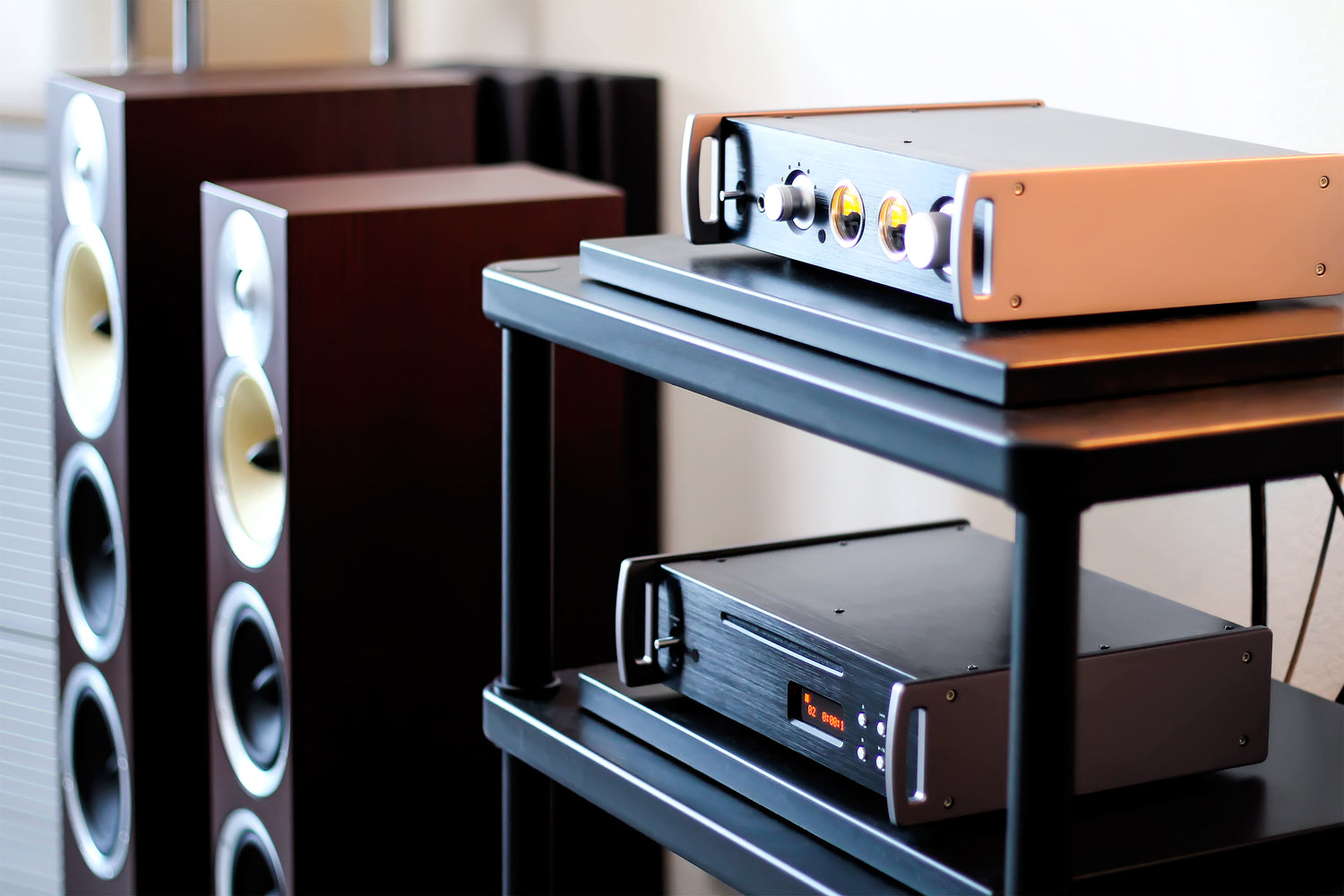The ultimate digital playback system with clock synchronization. Extremely powerful Super Audio CD player that reproduces delicate natural sounds and liveliness.
Type-R non-NFB circuits
The analog circuits adopt the newly developed Type-R non-NFB circuits. These are balanced voltage amplifier circuits constructed using only 4 high-frequency bipolar junction transistors and 8 resistors. The first stage uses differential amplification without any gain. Gain is only generated in the second stage, which is a grounded single-end amp. And by changing the output stage bias from a LED solution to a transistor thermal coupling, the conventional emitter resistance of 22ohm has been successfully reduced to a mere 1ohm. This incredibly simple construction effectively eliminates power source noise to allow overwhelming drive power and enable the sound to truly shine with fresh and vivid expressiveness.
Utilizes four ES9038PRO circuits
Each channel in the DAC chip uses two ES9038PRO chips, for a total of four in the player. Each channel’s incomparably powerful 120 mA current output is an essential element of the discrete non-NFB DAC. One current voltage conversion resistor converts this current output into a voltage directly before the first stage of the Type-R Circuit.
Ultra-low jitter clock
The master clock output from the DDS LMX2594 boasts an extremely low jitter of 45 femtoseconds to create a non-PLL sync from the DAC to the SACD mechanism. Without any transmission to the USB or LAN, the dynamic and transparent SACD playback with the DAC-driven I2S non-PLL sync (ES9038PRO’s 128fs mode) completely overturns any conventional impressions of SACD. The S-3 Reference features built-in ultra-low jitter crystals and can link with the ultra-high frequency external clock generator (10MHz) to further improve accuracy of the time axis. It uses a high-frequency relay for switching the standard clock to eliminate any chance of additional jitter.
RSR-2-12D (Reference SOULNOTE Relay)
An ultra-low loss glass tube sealed reed relay that performs similar to a mercury relay as a base has been further customized. This is an original custom relay created by SOULNOTE that can reach sound quality levels comparable to that of wire.
Ultra high-quality naked foil resistors
We have applied artificial satellite grade ultra-high precision foil resistors with exceptional temperature properties and have made additional customizations with an emphasis on sound quality. These ultra-high sound quality resistors were developed in-house and employ a naked foil design to eliminate dumps with mold resin.
ZERO LINK
SFORZATO Corp. and SOULNOTE teamed up to create ZERO LINK, the ultimate link that aims for high sound quality by eliminating asynchronous circuitry from D/A converters. Connecting a network transport equipped with ZERO LINK creates a network system that is completely synchronized with the DAC clock, achieving dramatic improvements in sound quality by eliminating asynchronous circuits in S-3 Reference.
Massive power channels
The power channels comprise the majority of the S-3 Reference body. The power supply for both the analog and digital systems are non-NFB power supplies using large, high-quality low magnification electrode foil capacitors housed under the SACD mechanism.
Foaming Teflon-covered single copper wires
All wires for the analog signals and the power supply use a SOULNOTE foaming teflon-covered single copper wire reference cable. Soldering them directly to the circuit boards eliminates any contact points.
NOS mode utilization
The S-3 Reference uses the same highly regarded NOS (Non oversampling) mode used in the D-2. This mode does not generate the pre- and post-echoes observed in FIR oversampling.
Impulse output waveform with an FIR oversampling filter
Pre- and post-echoes are artificial “sounds” created by data calculations before and after the data is interpolated. They make waveforms like sine waves appear smoother, but calculation algorithms can affect the sound quality or ambiguity and be added to the time-axis.
Impulse output waveform in Non oversampling mod
This waveform can only be achieved by combining a non-NFB discrete amplifier with superb transient response performance. Because music waveforms are actually a series of impulse waveforms of different heights, Non oversampling mode eliminates any ambiguity in the time axis information, creating a more realistic and natural sound quality and an expansive listening environment to the human ear, which is extremely sensitive to the time axis.
* Non oversampling mode cannot be used with DSD (SACD).
Independent left-right grounding for power transformers
The digital and analog systems are separated in the power transformer, with each system mounted independently on an aluminum base that transmits transformer vibrations from each base to a grounding spike. This eliminates motor or digital noise from entering the analog power supply while simultaneously avoiding intermodulation from two vibration sources, which commonly is a weakness of dual transformer configurations. A vital component of sound quality, the transformer base’s sandwich structure features an aluminum side floated at three points by titanium spacers and employs optimum materials, structure, and shape to eliminate resonance and avoid dumps.
SACD mechanism with direct grounding construction
The SACD mechanism is mounted directly on a grounding spike through the machined aluminum base. This ideal construction emits vibrations from the mechanism directly to the grounding spike, while maintaining the physical location of the mechanism with a high degree of accuracy.
Spike floating audio board
The floating audio board construction used in the SOULNOTE 2nd Series has further evolved so that the audio board itself is rests on three stainless steel spikes using spike receptacles engraved into the chassis. The parts of the aluminum audio board have been machined and made lighter, and the entire board has been meticulously tuned so that it almost sounds like there is no board at all.

Need Help?
Give us a call today at 914-907-7648 for expert advice and to discover more product offerings, plus exclusive deals you won’t find online! We are available seven days a week!
- Choosing a selection results in a full page refresh.





